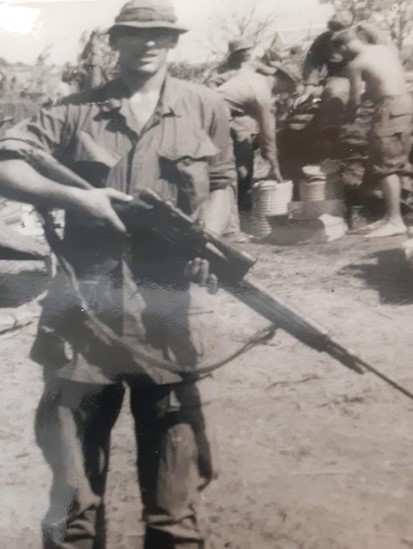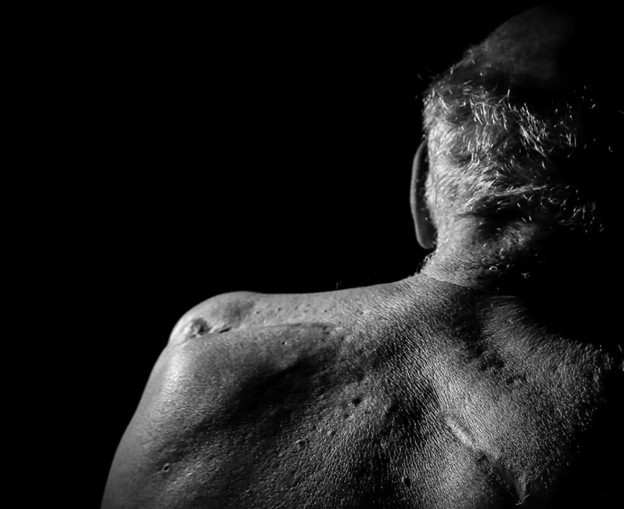All opinion articles are the opinion of the author and not necessarily of American Military News. If you are interested in submitting an Op-Ed, please email [email protected].
—
Welcome to small-town USA, or what many consider to be the “fly over” states. The true backbone of America, where patriotism can be seen and felt on every corner, from your local diner, area businesses, farms, and homes as the flag flies high and true through the prairies of the upper Midwest. The smell of home-cooked meals where families once gathered around a dinner table to discuss current events, life, or what was going on down at the local Clay County fair. The good ole days, you know back when life seemed to be so simple without all the booming technology, cell phones, and the distractions of social media and a 24-hour breaking news cycle.
The year was 1967 in Spencer Iowa, a quaint small farm town in the Western half of the state, and the home of 18-year-old Timothy Brinkley – A young man who had his sights and dreams of playing college football at nearby Estherville Junior College. Timothy (Tim) was fresh out of high school. He was a strong and healthy man, and he was ready to take on the world, and the next chapter in his life. Tim would go on to make the football team, however, his college days would be short-lived, and his college football career would end abruptly after his first semester of college after receiving a letter that instructed him to immediately report to Sioux Falls, South Dakota for a physical. This letter would change the course of Tim’s life forever.
It was now January of 1968, and Tim was off to Ft. Lewis for basic training after being drafted by the U.S. Army. Within a few short months, the Army trained this young man and shipped him and thousands of others like him off to Vietnam where he would be immediately placed into a full-fledged war. He was drafted as an “Eleven Bravo” 11B — or in civilian terms, an infantryman — the most dangerous of jobs at the height of the Vietnam War. Tim would encounter and live through the most horrifying sights, smells, and sounds of war, all while battling and engaging in “guerilla” warfare tactics amid fog-filled jungles where every single move he made could be his last. The jungles were filled with booby traps and snipers. A sniper himself, Tim knew the risks involved in this adrenaline-filled, heart-pounding, anxiety-riddled war, but he still made the sacrifices and did everything asked of him by the U.S. Army and the federal government.

The deck was completely stacked against him and his men as the war raged on progressively by the day, resulting in a great deal of fatigue, and anguish. He engaged in endless firefights and witnessed some of the deadliest battles fought in Vietnam. He would fight all the way to the bitter end and to the point of being medevac’d out of theatre in 1969. Thousands of soldiers were lost in Vietnam and paid the ultimate sacrifice while serving the United States of America in a war that was already considered to be costly, and extremely divisive.
Tim would not leave Vietnam unscathed. He was gravely injured by a booby trap and was shot several times leaving him with multiple injuries. While actively engaging in ground combat, then-19-year-old Tim was saved by a man that would end up earning the Congressional Medal of Honor. That man was SSG Don Jenkins — another brave and courageous small-town man from rural Kentucky.

After Tim was wounded, he was flown to Japan and was treated for gunshot wounds, and a blast. He was put into a body cast and would ultimately end up hospitalized at Fitzsimons Army Medical Center in Denver, Colorado for six months. Tim would go on to receive (3) Purple Hearts, (1) Silver Star, (2) Presidential Unit Citations, (1) Vietnam Gallantry Cross, and (1) Air Medal while he lay in his hospital bed.
The Vietnam War claimed the lives of more than 58,000 American service members and left an additional 150,000 American service members injured. Among the cruelest aspects of the war was when the soldiers returned home. They never had a “welcome home” experience after battling an extremely dangerous and bloody war.
Vietnam veterans were greeted with anger and hostility. The slurs of “baby killers” and “warmongers” were chanted as eggs were thrown at some of the most courageous men and women our nation has ever seen. Everyday social life turned into self-isolation, the isolation turned into depressiona and anxiety, and unfortunately, the depression & anxiety left thousands of Vietnam veterans suffering from the wounds of war. This would ultimately lead them to the streets of America as our homeless population numbers would increase as a nation and would be the beginning of what is now a generational and systemic issue that is driving the rates of Veteran suicide through the roof. The brave souls that once led this country with the utmost Honor, Courage, and Commitment, have been forgotten by the nation that has sworn to protect them.
The Vietnam veteran community is an “at-risk” population. Many suffer from drug and alcohol abuse, homelessness, severe PTSD, tremors, anxiety/depression, and the aftereffects of war. Chemical herbicides known as Agent Orange were also used in the war which contained a chemical contaminant called dioxin. Tens of thousands of people were killed due to chemical exposure, and to this day, deaths continue to claim the lives of U.S. service members. There are more than a dozen health conditions associated with and directly linked to Agent Orange exposure. Some include leukemia, respiratory cancers, Hodgkin’s disease, non-Hodgkin’s disease, soft tissue sarcomas, and multiple myeloma to name a few.
In my opinion, Vietnam veterans are the most disrespected, underappreciated, and undervalued generation in our nation’s history. It doesn’t take much to connect the dots and see the injustices that some of our nation’s finest men and women have encountered along their journey for the last 52 years. It’s all happened and unfolded right before our eyes, and to this day it’s still happening, with little to no pushback.
Life after the war was tough on Tim. He went back to college, and everything was much different than it once was back on campus. He was now a few years older than the other students and he didn’t really have any relatable life experiences with the other students. He mainly kept to himself, and when he did socialize, it was with other Vietnam veterans. He knew early on not to publicize his service or that he was a Vietnam veteran because it was rumored that if a professor found out, that would be close to an automatic “F”. Vietnam veterans were not liked, especially on college campuses. Just living life on eggshells like this was tough on its own, but adding the emotional, mental, and physical conditions he was experiencing at the time was a recipe for frustration and bottled-up anger.
In January of 1970, Tim received his first disability rating from the Department of Veterans Affairs (VA). It was a 20% rating which compensated him $43.00 per month. The claims were for multiple gunshot wounds, and a blast that left scarring all over his back, left and right shoulders, chin, and neck area. This is what a 3x Purple Heart, and 1x Silver Star Recipient rated, per the VA. Tim stayed at a 20% rating all the way to 1996 — after 26 years of fighting the VA — when he was upgraded to a rating of 30%. To add insult to veritable injury, he was denied VA disability compensation twice prior to his 10% increase in 1996.
By now I hope I have your attention. When I first met Tim last month at a veterans event, he was telling me his story and I literally fell ill after hearing how this American hero has been treated by the very government that swore to protect him. Tim’s not alone though. There are hundreds of thousands of veterans that have fallen through the cracks, and it’s unacceptable.
By 2001, the VA upgraded Tim’s service-connected disability to 50% and it stayed there all way until 2016 when he received his last upgrade which is currently at 60%. This highly decorated combat veteran who fought tooth and nail for his country is now fighting for rightful compensation — so beyond deserving it makes me sick to even write this.
1. How broken are we as a nation to allow this to happen?
2. Have we completely lost the heart, soul and minds of who we are as Americans?
3. How does this happen to our nation’s most vulnerable and at-risk populations?
On behalf of SPC4 Timothy Brinkley and the Vietnam veteran community, I am asking you for your help to raise the awareness that’s needed to help veterans like Tim receive the VA compensation disability that they deserve. After 52 years of battling the VA for a total rating of 60%, Tim is tired. He is now in his 70s and suffers tremendously from heart problems, PTSD, hearing loss, his shoulders, his back, and chronic pain. Please help me, help the Vietnam Veterans of America. They are the Forgotten Ones.
Respectfully,
Brian J. Tally, Veteran Advocate
—-
Brian Tally is a U.S. Marine Veteran. He is a former Sgt. in the United States Marine Corps. He was stationed in Camp Lejeune, in North Carolina, where he served with BTO Co. 2d FSSG; in Okinanwa, Japan, where he served with Landing Support Co. 3d FSSG; and Camp Pendleton, having served with base Hazmat/Compliance. He enlisted in 1994 and served active from 1995 to 1999. Brian has been married for 20 years and has four children.



